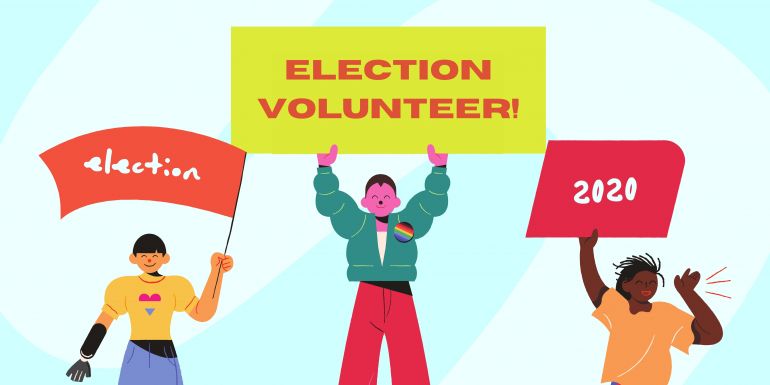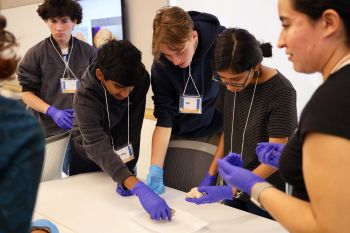Author: Allyson Nesmith is a senior at Vanderbilt University. We’re also thrilled to introduce her as the Center’s Digital Communications and Social Media Intern.
It’s not a coincidence that adolescents have been at the forefront of nearly every major social movement in the past century. Research into adolescent development suggests that we may be primed to give and contribute to others and that we have a developmental need to contribute in the years between childhood and adulthood. The extent of youth involvement in the most recent election shows how deeply our communities can benefit when young people get involved.
The massive turnout of youth voters in the 2020 election was one key factor in the outcome. As we have seen, more adolescents voted in this election than ever before. But casting their vote wasn’t the only way adolescents were involved with this election.
This past week I talked to my friend Ashwin Kanuru, who is a current senior at UC Berkeley. We are both from Georgia (a key state in this election), and he told me about the extensive work he did behind the scenes in this election.
“It all began months before the election,” Kanuru said. He spent the summer working as a digital organizer and field intern for the Alabama Democratic Party/Senator Doug Jones’ Reelection Campaign. As an intern, he was responsible for creating “pre-made texts and viable potential responses for a group of volunteers that were text banking and being ‘on-call’ via Slack in case any of them had any questions.” Kanuru spent around 8 hours a week in this position throughout the summer.
A few weeks before the election, absentee ballots were sent out. Because of the extraordinary circumstances regarding COVID this year, more people had the opportunity to cast a mail-in ballot as opposed to voting in person. “Lots of people who requested an absentee ballot were currently in Georgia, but they didn’t want to risk getting sick,” said Kanuru.
During this time, Kanuru served as a ballot remediator in Cobb County, Georgia, where he helped people who had questions about their absentee ballot. “I had a whole file of cases of individual people whose absentee ballots were flagged and I had to call and help them cure their ballot or fix their problem,” said Kanuru. Common issues he observed included needing to help people who had to reapply for their application, people signing on the wrong line or forgetting to sign in general, signature match issues, and failing to put them in the right envelope. Before he could help them cure their ballot, however, they needed to fill out an affidavit that confirmed their identity to prove that it was actually them voting. Overall, he spent 5-6 hours a week as a remediator.
On election day, Kanuru got up at around 5 a.m. to take his position outside of various polls throughout Georgia. Here, he double checked with the people in line at polling centers to ensure that they had all of the documentation needed to vote, in order to (hopefully) prevent them from being turned away.
Around noon, he began his work as a roving poll monitor. “Basically, people can call the 866-OUR-VOTE hotline and report their problems, or they can report their issue to a stationary poll monitor at their voting station,” said Kanuru. Once they called the hotline, he provided backup, support, and documented their issue as well as comforted the people who reported the problem, making sure that they felt heard and that their claims were being taken seriously. Common problems included complaints about being turned away from the polls, about the technology itself, and about voter intimidation, such as people supporting candidates from inside the 200-foot no electioneering zone around the polling center. “All of the voter intimidation and suppression documentation I did at the polls was submitted online to the NAACP so that their team of lawyers could take legal action if necessary,” said Kanuru.
“Overall, being a roving poll monitor was interesting because when you’re going from precinct to precinct, you see how different each set up is depending on the neighborhood,” Kanuru explained “Typically, there are longer lines in lower-income communities. However, because so many people voted early, the lines were never too long.” His poll monitor work continued until around 6 p.m. when many centers began to close across Georgia.
But, Kanuru’s work was not over. The following weekend, Kanuru spent his time at the Cobb County Elections office, where he helped dozens of volunteers count ballots. Georgia was an incredibly close race, and it was crucial that every vote was counted.
“The bulk of what I did was open provisional ballots and sort them into piles because I’m a novice,” Kanuru explained. “But each ballot has a fairly complicated chain of custody to make sure individual people don’t compromise their integrity. It takes multiple confirmations at each step.”
Overall, he spent over 40 hours during election week alone helping out in all of these roles. From digital field intern to ballot counter, he was incredibly involved in the election, and his help is an example of the many ways in which adolescents were actively engaged in this election.
I asked him about what made him want to get involved in the first place. He said, “I am passionate about grassroots political organizing in the deep South because as one of the highest minority areas in the country, people here are heavily underrepresented. That’s what sparked it.”



_350_233_80_c1.jpg)